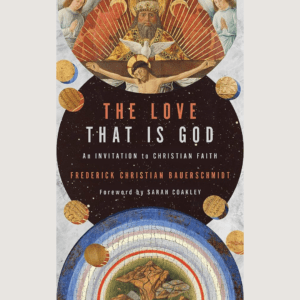 In his July 5th letter while on sabbatical, Bill mentioned a book, The Love That is God: An Invitation to Christian Faith by Frederick Christian Bauerschmidt. I picked it up and found myself drawn not only by Bauerschmidt’s insight but also by his giving words to thoughts and stirrings that have been in my mind and heart. I wonder if you might find that as well. Here are some of my highlights from the book:
In his July 5th letter while on sabbatical, Bill mentioned a book, The Love That is God: An Invitation to Christian Faith by Frederick Christian Bauerschmidt. I picked it up and found myself drawn not only by Bauerschmidt’s insight but also by his giving words to thoughts and stirrings that have been in my mind and heart. I wonder if you might find that as well. Here are some of my highlights from the book:
From the Introduction (Pages 13,14)
The idea for this book arose after I preached a sermon that I have included as the epilogue of this book, where I tried to sketch in five points what I took to be the heart of Christianity: God is love; the love that is God is crucified love; we are called to friendship with the risen Jesus; we cannot love God if we do not love each other; and we live out our love from the community created by the Spirit.
From Chapter 4, “We cannot love God if we do not love each other.” (Pages 77-79)
Catherine of Siena accepts on faith the connection Jesus makes between love of God and love of neighbor. But, being a person of considerable intelligence who desires ever-deeper friendship with God, she seeks to glimpse why there is such a connection. Why should love shown to “the least of these” count as love shown to Jesus? Why should friendship with God be tied to friendship with other people? …
In her work The Dialogue, God speaks to Catherine, saying, “I ask you to love me with the same love with which I love you. But for me you cannot do this, for I loved you without being loved. Whatever love you have for me you owe me, so you love me not gratuitously but out of duty, while I love you not out of duty but gratuitously. So you cannot give me the kind of love I ask of you.” Having posed the dilemma, God then provides Catherine the answer: “This is why I have put you among your neighbors: so you can do for them what you cannot do for me—that is, love them without any concern for thanks and without looking for any profit for yourself. And whatever you do for them I will consider done for me” ([The Dialogue] chap. 64).
God identifies with our neighbor just so we can do for the neighbor what we cannot do for God, which is to love another with complete and total generosity. Moreover, it is precisely this recognition of how freely and generously we have been loved by God that inspires our free and generous love of neighbor: “Seeing that we are loved, we cannot do anything except love” (Letter 50, in O’Driscoll, Passion for Truth, 29).
Catherine sees a kind of triangulation of love: from God to us, from us to our neighbor, and from our neighbor back to God. In doing so, she not only shows something about our friendship with God but also shows something about our friendship with each other. …
In this way, human friendship dimly reflects the even more mysterious mathematics of divine-human friendship, in which God gives the creature everything, the creature gives the neighbor everything, and God rejoices always in this exchange of love.
